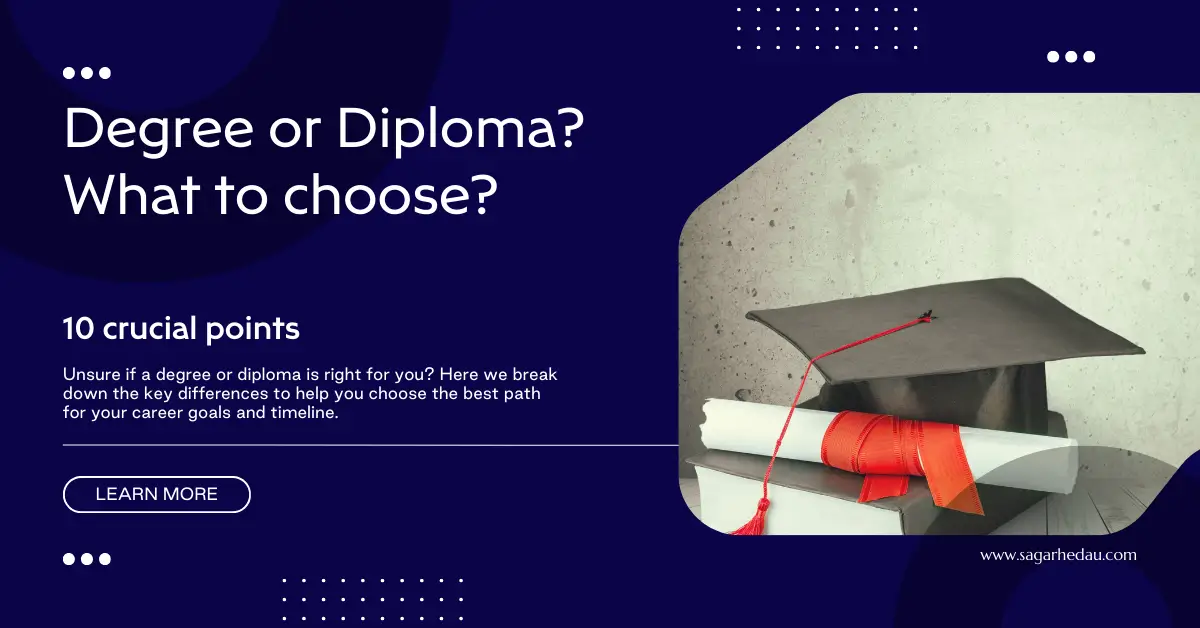Stuck in the “degree or diploma” debate? You’re not alone. Deciding between these two paths can feel overwhelming. This post will break down the pros and cons of each option, helping you pick the route that fast-tracks you to your dream career.
From job prospects to program length, we’ll explore everything you need to consider to make an informed decision. So, whether you’re a high school graduate or looking for a career change, keep reading to map out your educational success.
Degree or Diploma? What to choose?
Ever felt lost in a sea of educational options? Choosing between a degree or diploma can be a major head-scratcher. Both paths offer exciting possibilities, but which one is the right fit for you?
A degree, like a Bachelor’s or Master’s, provides a broad academic foundation. It delves deeper into a chosen field while exposing you to diverse subjects and developing critical thinking skills. Diplomas, on the other hand, are laser-focused. They equip you with the specific skills and knowledge needed to excel in a particular trade or industry, often in a shorter timeframe.
This guide will be your compass, helping you navigate the decision-making process. We’ll explore factors like career goals, learning styles, and resource limitations. By the end, you’ll be well-equipped to choose the path that propels your career forward!
If you still have a certain level of confusion, you can talk to our career counsellor to get further clarification. Click the image below to schedule a personalized counselling session.
II. Understanding Degrees and Diplomas: Unveiling the Paths
Degrees: Building a Strong Foundation
- A degree is an academic credential awarded by universities and colleges upon successful completion of a structured program of study. There are various types of degrees, each with its own time commitment and focus:
- Bachelor’s Degree: This foundational degree typically takes 3-4 years to complete and provides a broad knowledge base in a chosen field, along with core courses in areas like communication, mathematics, and critical thinking.
- Master’s Degree: Building upon a bachelor’s degree, a Master’s program typically takes 1-2 years and offers advanced studies in a specific specialization within a field.
- Doctorate (PhD): The pinnacle of academic degrees, a PhD program can take anywhere from 4-8 years and involves extensive research culminating in a dissertation that contributes original knowledge to a particular field.
Types of Degrees: Charting Your Academic Path
Degrees come in various forms, each offering a different level of education and specialization. Here’s a breakdown of the most common types:
- Bachelor’s Degree (3-4 years): This foundational degree provides a broad base of knowledge in a chosen field, along with core courses in areas like communication, mathematics, and critical thinking. Here are some popular Bachelor’s specializations:
- Bachelor of Arts (BA): Focuses on humanities, social sciences, and language studies.
- Bachelor of Science (BS): Emphasizes science, mathematics, and technology fields.
- Bachelor of Engineering (B.Tech): Offers specialized training in various engineering disciplines like computer, electronics, or civil engineering.
- Bachelor of Architecture (B.Arch): Focuses on architectural design principles and practices.
- Bachelor of Commerce (B.Com): Provides a strong foundation in business and commercial principles.
- Bachelor of Business Administration (BBA): Offers a management-oriented approach to business education.
- Bachelor of Computer Applications (BCA): Emphasizes the application of computer science principles in various fields.
- Master’s Degree (1-2 years): Building upon a Bachelor’s degree, a Master’s program offers advanced study and specialization in a specific field. Here are some common Master’s degrees:
- Master of Arts (MA): Focuses on advanced study in humanities and social sciences.
- Master of Science (MSc): Offers in-depth study in science and technology fields.
- Master of Technology (M.Tech): Provides advanced training in specialized engineering disciplines.
- Master of Business Administration (MBA): Equips graduates with advanced business management skills.
- Master of Commerce (M.Com): Offers advanced study in commerce and related fields.
- Master of Computer Applications (MCA): Provides advanced training in computer application development.
- Doctoral Degree (Variable Timeframe): The pinnacle of academic degrees, a doctorate involves extensive research culminating in a dissertation that contributes original knowledge to a specific field. Here are some common Doctoral degrees:
- Doctor of Philosophy (Ph.D.): Awarded across various disciplines for research-based doctoral programs.
- Doctor of Education (Ed.D.): Focuses on advanced study in educational theory and practice.
- Doctor of Medicine (M.D.): A professional degree required for the practice of medicine.
- Doctor of Dental Medicine (D.M.D.): A professional degree required for the practice of dentistry.
- Doctor of Juridical Science (S.J.D.): An advanced law degree focused on legal scholarship and research.
- Doctor of Business Administration (DBA): An advanced business degree focused on research and scholarship in the business field.
Diplomas: Sharpening Your Skills for a Specific Trade
- A diploma is a career-oriented credential awarded by various institutions, including community colleges, vocational schools, and professional training organizations. Diplomas provide focused training in specific skills and knowledge needed for immediate entry into a particular profession. Here’s a breakdown of some common diploma types:
- Vocational Diplomas: These programs equip students with practical skills for trades like carpentry, welding, or cosmetology.
- Technical Diplomas: Focused on specialized technical knowledge, these diplomas prepare students for careers in fields like computer networking, paralegal studies, or medical assisting.
- Advanced Diplomas: Building upon foundational skills, these programs offer further specialization within a trade or technical field.
Diploma Courses: Launching Your Career
Diploma courses are vocational programs that equip you with practical skills for specific careers. They often require a high school diploma (10th or 12th grade) for admission and can be completed in a shorter timeframe compared to undergraduate degrees.
Here are some popular diploma programs across various fields:
- Engineering: Gain hands-on training in various engineering disciplines, preparing you for technician or assistant roles.
- Graphic Design: Develop skills in visual communication, software usage, and design principles to launch a career in graphic design.
- Hotel Management: Learn the ins and outs of hospitality operations, from guest service to food and beverage management, preparing you for roles in the hotel industry.
- Fashion Design: Immerse yourself in the world of fashion, learning about design concepts, garment construction, and the fashion business.
- Animation and Multimedia: Master the art of creating animation and multimedia content, opening doors to careers in the animation or media industry.
- Nursing: Prepare for entry-level nursing positions by gaining the knowledge and skills required for patient care.
- Event Management: Learn how to plan, organize, and execute successful events, making you a valuable asset in the event management field.
These are just a few examples, and there are many other diploma programs available in various sectors. By choosing a diploma program that aligns with your interests, you can gain the skills and knowledge needed to launch a successful career in your chosen field.
Level Up Your Skills: Post-Graduate Diploma Courses
Post Graduate Diploma (PG Diploma) courses are designed for individuals who already hold a Bachelor’s degree. These programs provide specialized training and advanced knowledge in a specific field, allowing you to refine your existing skillset or explore a new career path. Here are some popular PG Diploma options:
- Management: Enhance your business acumen with a PG Diploma in Management, focusing on areas like marketing, human resources, or finance.
- Law: Deepen your legal knowledge in a particular area of law, like intellectual property or criminal justice, through a specialized PG Diploma.
- Medical Sciences: Pursue advanced training in a specific medical field with a PG Diploma program in areas such as public health or medical laboratory technology. (Note: There likely isn’t a PG Diploma in both Journalism and Medical Sciences at the same time.)
- Business Analytics: Master the art of data analysis and interpretation with a PG Diploma in Business Analytics, becoming a valuable asset in today’s data-driven world.
- Computer Applications: Gain advanced skills in software development, network security, or other specialized areas through a PG Diploma in Computer Applications.
- Hotel Management: Elevate your hospitality expertise with a PG Diploma in Hotel Management, focusing on advanced topics like revenue management or hospitality leadership.
Degree or Diploma | Key Differences
| Feature | Degree | Diploma |
|---|---|---|
| Time Commitment | Longer (typically 3-4 years for a Bachelor’s) | Shorter (typically 1-2 years) |
| Focus | Broader range of subjects, develops critical thinking skills | Specific skills and knowledge for a particular field |
| Career Opportunities | Wider range of job opportunities | Qualifies for specific jobs in a specific industry |
| Cost | Higher cost | Generally lower cost |
| Skills Development | Develops critical thinking, analytical, and problem-solving skills | Develops practical skills for specific jobs |
The key distinction lies in the focus of each program. Degrees offer a well-rounded education, developing critical thinking and research skills alongside subject-specific knowledge. Diplomas prioritize practical skills and knowledge directly applicable to a specific job or industry.
Factors to Consider When Choosing a Degree or Diploma
Choosing the right path requires careful consideration of several factors:
Your Career Goals: The Destination in Mind
- Field Requirements: Research your desired career field. Does it typically require a degree, or is a diploma sufficient for entry-level positions?
- Skill Set for Success: Identify the specific skills and knowledge needed to excel in your chosen career path. Does a degree program offer a broader skillset applicable to various roles within the field, or does a diploma program provide the targeted skills you need for a specific job?
Time and Financial Resources: Fueling Your Journey
- Time Commitment: How much time can you realistically dedicate to studying? Degrees require a longer time investment, while diplomas offer a quicker path to entering the workforce.
- Financial Investment: Cost is a significant factor. Degrees typically come with a higher price tag than diplomas. Consider tuition fees, living expenses (if applicable), and potential financial aid options.
Learning Style Preference: Choosing Your Learning Landscape
- Academic Exploration vs. Focused Training: Do you thrive on a broad academic experience with diverse subjects, or do you prefer a more hands-on learning environment focused on acquiring specific skills for your chosen field?
- Independent Learner vs. Structured Environment: Degrees can offer more flexibility in course selection, while diplomas often follow a structured curriculum with a clear career objective. Consider if you prefer independent learning or a more structured environment.
Degree or Diploma: Advantages
Advantages of a Degree: Building a Well-Rounded Skillset
A degree program offers a multitude of advantages that can shape your future success:
A. Expanding Your Horizons: A Wider Career Landscape
A degree equips you with a broader range of knowledge and skills, opening doors to a wider variety of career opportunities within your chosen field and even beyond. This flexibility allows you to explore different options and potentially pivot careers down the line if your interests evolve.
B. Sharpening Your Mind: The Power of Critical Thinking
Degrees cultivate critical thinking, analytical, and problem-solving skills. You’ll learn to research, analyze information, and approach challenges creatively. These valuable skills are highly sought after by employers across various industries and can be applied throughout your career.
C. Investing in Your Future: The Potential for Higher Earnings
Studies consistently show that individuals with a degree tend to earn a higher salary over their lifetime compared to those with only a diploma. The broader skillset and increased job opportunities associated with a degree can translate to greater earning potential throughout your career trajectory.
Advantages of a Diploma: Fast-Track to Career Success
While a degree offers long-term benefits, a diploma program shines with its distinct advantages:
A. Time is Money: Entering the Workforce Faster
Diplomas are typically shorter programs, allowing you to enter the workforce significantly quicker compared to a degree. This translates to faster financial independence and the opportunity to start accumulating real-world experience sooner.
B. Sharpening Your Tools: Targeted Skill Development
Diplomas are laser-focused on providing the specific skills and knowledge needed to excel in a particular trade or industry. You’ll gain practical experience through hands-on training and learn the latest industry tools and techniques, making you a highly sought-after candidate for specific job openings.
C. Cost-Effectiveness: Investing Wisely
Diplomas generally come with a lower price tag than degree programs. This makes them a more affordable option, especially for individuals with financial constraints. The quicker entry into the workforce also allows you to start earning sooner, helping recoup your investment faster.
Can You Have Both Worlds? Combining Degrees and Diplomas
Absolutely! You’re not limited to choosing just one path. Here are a couple of ways you can leverage both degrees and diplomas:
- Stacking Credentials: Pursue a diploma first to gain practical skills and enter the workforce quickly. Later, you can utilize your work experience to potentially qualify for accelerated degree programs or online learning options, allowing you to earn a degree while working.
- Dual Enrollment: Some institutions offer programs that allow you to earn both a degree and a diploma concurrently. This approach can be time-intensive, but it equips you with a well-rounded skillset and potentially opens even more career doors.
After the 10th standard, you are eligible for a diploma and not a degree. But after the 12th standard, you are eligible for both. The choice is yours. With respect to finances, some people may choose a diploma over a degree. It is a very particular choice.
Degree or Diploma: The Salary Scenario
Generally, a bachelor’s degree opens doors to higher salaries than a diploma. This is because bachelor’s programs offer a broader range of knowledge and critical thinking skills that employers value. For instance, in India, the average salary for someone with a bachelor’s degree falls between ₹3,00,000 and ₹6,00,000, while a diploma holder might earn ₹2,20,000 to ₹4,00,000.
However, there are exceptions. In some countries and specific professions, diploma holders can earn more than their degree-holding counterparts. For example, certain technical fields like electronics or information technology might prioritize hands-on skills and certifications that diploma programs often emphasize.
The key takeaway is to consider the specific job market and industry when choosing between a diploma and a degree. While a bachelor’s degree generally provides a broader career path and higher earning potential, diplomas offer a faster track to specialized skills and can be very lucrative in certain fields.
Conclusion
Choosing between a degree and a diploma is a crucial decision, and the right path ultimately depends on your unique circumstances and career aspirations.
Remember:
- Self-awareness is Key: Carefully consider your learning style, financial resources, and time constraints.
- Align Your Goals: Research your desired field and identify the specific skills and qualifications employers seek.
Take Action!
Don’t stop here! Dive deeper and research specific degree and diploma programs that align with your interests. Explore program structures, course offerings, and career services provided by different institutions.
By carefully considering the information presented and conducting thorough research, you’ll be well-equipped to make an informed decision that propels you towards a fulfilling and successful career.pen_sparktunesharemore_vert




